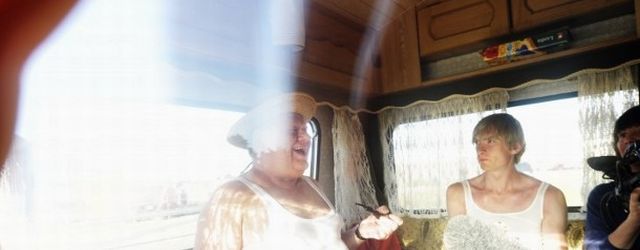
De komende dagen zou op De Internationale Keuze in Rotterdam de voorstelling Der perfekte Tag – Ruhrtrilogie Teil 3 van de Duitse regisseur René Pollesch spelen. Maar helaas, de belangrijkste speler, Fabian Hinrichs, heeft zijn been gebroken en de voorstelling moest worden afgelast. Wat lopen we nu mis?
De afgelopen jaren zag ik in Berlijn een aantal voorstellingen van René Pollesch in zijn thuisbasis, de Volksbühne in Berlijn. Kan ik ook maar enigszins navertellen waar die zo over gingen? Ehhm, nee. Maar was het geestig, intelligent en soms briljant theater? Zeker! Allereerst de titels. Voorstellingen die ik zag heetten Darwin-Win & Martin Loser-Drag-King & Hygiene auf Tauris, Liebe ist kälter als das Kapital of Ich schau dir in die Augen, geselschaftlicher Verblendungszusammenhang. De voorstellingen zijn al net zo eclectisch, speels en overdadig. Pollesch gebruikt sociologische theorieën, gortdroge economische analyses en ander bijzonder on-theatraal basismateriaal voor zijn teksten en laat de acteurs die dan weer in een over-the-top theatrale setting uitbraken. De ene keer in ruisende Biedermeierjurken met een bordkartonnen deuren-decor, dan weer met het publiek op het toneel de enorme publieksruimte van de Volksbühne in kijkend.
In zekere zin is het anti-theater wat Pollesch maakt. Er is geen illusie, geen representatie. In het gebruik van basismateriaal wat niet tot het standaardrepertoire voor het theater behoort, is hij een typische representant van de studie ‘toegepaste theaterwetenschap’ in Giessen, waar hij in 1989 afstudeerde. Ook documentairetheatergroep Rimini Protokoll en performancekunstenaars She-She-Pop komen daarvandaan. Soms gebruikt Pollesch wel toneelstukken – het liefst 19e eeuwse boulevardkomedies – maar dan alleen als raamwerk van opkomsten en afgangen om zijn eigen abstracte tekstconstructies, die voor niet-Duitstaligen vaak moeilijk te volgen zijn, aan op te hangen.
In Pollesch’ wereld bestaat geen mainstream, alles is obscuur. Of het nu zijn filmcitaten zijn, de sociale theorieën die zijn personages prediken of de toneelstukken die hij verhaspelt. Maar de vormen zijn meestal wel herkenbaar. Hij maakt veel gebruik van televisieformats als spelshows, soaps. Maar waar gaat het Pollesch nu eigenlijk om? ‘Ik wil geen verhalen vertellen. We thematiseren dat verhalen vertellen eigenlijk niets zegt,’ zei hij een paar jaar geleden in een interview. Hij ziet zijn werk als een strijd tegen de ‘regulering van de werkelijkheid, de bevestiging van de sekseverdeling en de normalisering van vooroordelen. Wij proberen met ons theater de positie van de blanke, heteroseksuele, mannelijke verteller ter discussie te stellen, die positie die altijd als ‘neutraal’ wordt gezien.’ Verhalen die te ver van die norm af staan worden ‘onleesbaar’. Dat is een ferme filosofische stellingname en eentje die politiek is op een niveau dat in het Nederlandse theater – met z’n ‘filmscripts die het moderne leven uitbeelden op een soapy manier’ aldus Joan Nederlof – nauwelijks lijkt te bestaan.
In zijn laatste voorstellingen lijkt Pollesch iets meer in te spelen op de actualiteit. Ich schau dir in die Augen, geselschaftlicher Verblendungszusammenhang, een solo van Fabian Hinrichs (volgens de Duitse critici de beste rol van vorig seizoen), is een complexe beschrijving van het idee van een ‘representatiecrisis’. In het theater hadden we die al; je kunt op het toneel eigenlijk niet meer serieus doen alsof je iemand anders bent – het publiek kent de alle toneelspeeltrucs al. Maar nu is die er ook in de economie; we dachten dat ons geld, onze pensioenafdrachten of onze hypotheken iets representeerden, maar de crisis heeft ons geleerd dat dat een illusie was. Heeft de economie dat misschien geleerd van het theater, oppert Pollesch. Het probleem is dat Pollesch’ voorstellingen gebruik maken van een vocabulaire en een manier van denken die in Nederland niet gangbaar is. In onze media wordt niet verwezen naar academische theorie om vraagstukken in de maatschappij te beschrijven of te duiden. En ook het burgerlijke theater waar hij zich zo fel tegen afzet bestaat hier nauwelijks. Dat maakt zijn voorstellingen hier misschien wel ‘onleesbaar’.
Het is jammer dat we dat niet kunnen controleren, maar er is een troost: de Nederlandse theatergroep De Warme Winkel wil samen met Pollesch een voorstelling gaan maken. Ik kijk daar enorm naar uit. Want daarmee lijkt in ieder geval het taalprobleem uit de weg geruimd, en dan kunnen we kijken welke pijnpunten Pollesch in de Nederlandse situatie weet te raken.


Ter aanvulling: de samenwerking van De Warme Winkel met René Pollesch is al een feit. Pollesch was in augustus een week in Rotterdam om met De Warme Winkel te werken aan hun Poëten en bandieten. Begin september zou hij terugkomen maar dat kon helaas niet doorgaan (hij sprong in bij een operaproject van de gestorven Christoph Schlingensief). Het idee was om naast het inderdaad grandioze Der perfekte Tag van René Pollesch, een internationaal perspectief voor De Warme Winkel te creëren. En dat dat idealiter met Pollesch moest, was snel beklonken.
Tegen een gebroken been valt niet op te plannen, maar De Internationale Keuze is nu al in gesprek over Ich schau dir in die Augen, geselschaftlicher Verblendungszusammenhang voor de editie 2011. Dat kan tellen als revanche.
Annemie Vanackere
De Internationale Keuze
Reacties zijn gesloten.